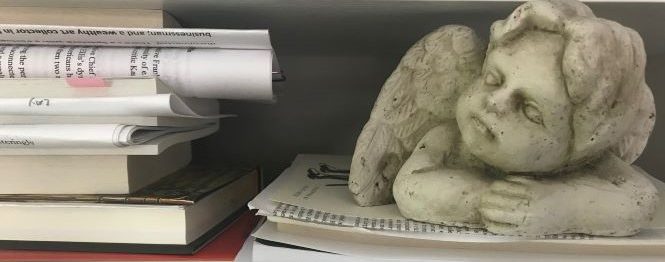Lucas Bessire’s book about the Ogallala aquifer nourishing life on the American Great Plains was a finalist for the nonfiction 2021 National Book Award. That’s how it came to my attention and, as some books do, got its hooks into me.

I won’t drag you through the many times I asked about it at a bookstore or hovered over a buy button or why reading a library copy wouldn’t be enough. (It has to do with the alluring book jacket design by Daniel Benneworth-Gray.) Buying or owning sometimes can be a process for those of us in love with books. I’ll leave it at that. “Anthropologist Lucas Bessire journeyed back to western Kansas, where five generations of his family lived as irrigation farmers and ranchers, to try to make sense of this vital resource and its loss,” says the jacket copy of Running Out: In Search of Water on the High Plains. It also says the book is an “account of family, complicity, loss, and what it means to find your way back home.” I’ve put this off too long.

New York Review Books published Celia Paul’s Letters to Gwen John this year. I can’t remember where I read the review about the letters (positive), which turned me toward Celia Paul’s autobiography as the better book or, perhaps, the one the reviewer liked best. She wrote about it so convincingly that I ordered a copy. I began reading it yesterday and already find myself looking forward to its clean prose and intimate lens. Self-Portrait focuses on Celia Paul’s life as it pertains to her art years, ranging in time from her arrival at the Slade School of Fine Art through her affair with the artist Lucian Freud to her present-day studio. Here’s a bit from the prologue:
One of the main challenges I have faced as a woman artist is the conflict I feel about caring for someone, loving someone, yet remaining dedicated to my art in an undivided way. I think that generally men find it much easier to be selfish. And you do need to be selfish. Ideally you need ‘to care and not to care.’ You need to give yourself completely, while at the same time seeing things from a distance.
Paul further explains in the prologue the importance of writing about her life in her own words, choosing prose instead of paint “because words can communicate more directly. The hermetic language of painting necessarily keeps its secret: its power remains mysterious.” The book includes lovely illustrations of her paintings.

Several years ago, I read an article in the London Review of Books about the spirits of those who so violently, swiftly, and unexpectedly lost their lives in the black wave of Japan’s tsunami on March 11, 2011. I was deeply affected by the survivors’ interactions with these restless souls. Not surprising then that I’d want to read Ganbare! Workshops on Dying by Katarzyna Boni, translated from the Polish by Mark Ordon. The book’s description says it gives voice to the survivors of the catastrophic event — the “earthquake and subsequent tsunami that ravaged Japan [lasting] a mere six minutes” — and provides “an intimate, soul-aching, and above all human look at how people come to deal with loss, trauma, and death.” The table of contents includes a chapter on ghosts, which caught my interest because of the aforementioned article.
The Japanese believe that the souls of the deceased will not find peace until their bodies are cremated and put to rest in the family grave. The grave works like a gate – it lets the deceased go to paradise and return to Earth during Obon, the festival of the dead in August. The dead take care of the living. The living take care of the dead.
From “Ghosts” in Ganbare! Workshops on Dying
On the page preceding the table of contents, the Japanese word ganbare is defined as encouragement: Give it your all! Hang in there! Fight! You can do it! We’re told it has been the most commonly repeated word in Tōhoku, the northwestern region of Japan destroyed by the tsunami. The page, with this information and more, is brief in its content, but it speaks volumes. So, too, I’m sure, will all of this book I feel drawn to read.
